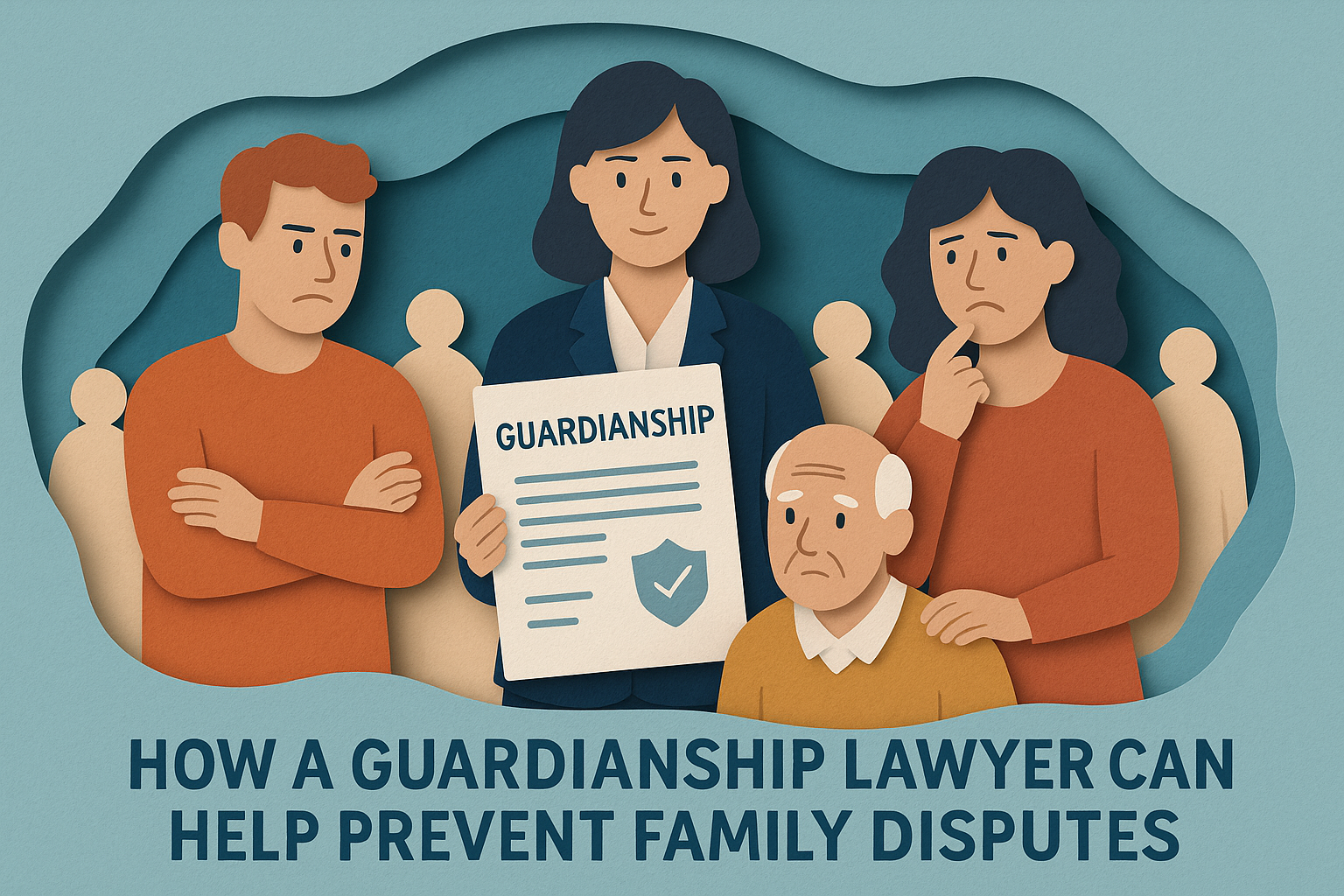
How a Guardianship Lawyer Can Help Prevent Family Disputes
Guardianship is one of the most sensitive legal processes a family can face. It arises when a person, known as the ward, can no longer manage their personal, medical, or financial affairs due to age, illness, or disability. In these situations, a court may appoint a guardian to make decisions in the ward’s best interests. While guardianship is designed to protect vulnerable individuals, it often unfolds in a context of emotional stress, uncertainty, and competing family perspectives, which makes preventing family disputes in guardianship a critical goal for families seeking both legal protection and peace of mind.
When family members disagree on what is best for the ward, the potential for conflict is high. Disputes can emerge over who should serve as guardian, how money should be managed, or where the ward should live. Without proper legal guidance, these disagreements can escalate into costly and damaging court battles. A guardianship lawyer’s role is not only to navigate the legal process but also to help families avoid or minimize these disputes.
In this article, we will examine the ways a guardianship lawyer can help prevent family conflicts, why early intervention is key, and the strategies lawyers use to keep the focus on the ward’s best interests.
Understanding the Roots of Guardianship Disputes
Before exploring how a lawyer can help prevent disputes, it is important to understand why they happen. Common triggers include:
-
Competing views on care
-
Financial concerns
-
History of family conflict
-
Unclear legal authority
-
Perceived favoritism
A guardianship lawyer helps address these root causes before they turn into larger disputes.
Clarifying Legal Rights and Responsibilities
Many family disputes begin because relatives do not fully understand what guardianship entails. A guardianship lawyer provides clarity on:
-
The specific legal authority a guardian has
-
Which decisions require court approval
-
The guardian’s duty to act in the ward’s best interests
-
The limits of the guardian’s powers
-
The reporting requirements to the court
By explaining these responsibilities early, a lawyer helps set realistic expectations. Family members are less likely to challenge decisions when they understand that the guardian is bound by law to follow certain procedures and standards.
Identifying Less Restrictive Alternatives
Sometimes conflict arises because one person believes guardianship is too extreme, while another sees it as necessary. A guardianship lawyer can evaluate whether less restrictive options, such as a power of attorney, health care directive, or trust, might address the ward’s needs. Exploring alternatives can reduce tension by showing that every option has been considered and that guardianship is being pursued only if it is truly the best solution.
Guiding Families Through the Selection of a Guardian
One of the most common disputes is over who should serve as guardian. This choice can be emotionally charged, particularly when multiple family members feel qualified. A guardianship lawyer can help in several ways:
-
Explaining the court’s criteria for selecting a guardian
-
Assessing qualifications based on legal and practical considerations
-
Encouraging open discussion about responsibilities and expectations
-
Suggesting co-guardianship or division of duties when appropriate
By framing the decision in legal terms and focusing on the ward’s needs, the lawyer can shift the conversation from personal rivalry to problem-solving.
Mediating Disagreements Before They Escalate
Guardianship lawyers are skilled in negotiation and mediation. They can facilitate discussions between family members, identify points of agreement, and find compromises that prevent disputes from becoming formal litigation. This approach saves time, reduces costs, and preserves family relationships. For a deeper perspective on how legal intervention can ease conflict, see Hackard Law’s blog From Heir to Adversary: Real Stories of Sibling Litigation in California Trusts.
Ensuring Transparency in Financial Matters
Money is often at the center of guardianship disputes. Concerns about mismanagement or misuse of funds can quickly damage trust. A guardianship lawyer helps prevent these problems by:
-
Setting up proper accounting systems
-
Advising on what expenses are permissible
-
Preparing accurate and timely reports for the court
-
Recommending third-party oversight if needed
When financial matters are handled transparently from the start, there is less room for suspicion and conflict.
The Long-Term Impact of Preventing Disputes
Preventing disputes benefits everyone involved. The ward receives consistent care without interruptions caused by litigation. The guardian can focus on their duties instead of defending their decisions in court. Family members maintain relationships instead of becoming adversaries. Financial resources are preserved for the ward’s needs rather than spent on legal battles.
Final Words
Guardianship can be a necessary and protective measure for a vulnerable loved one, but it also has the potential to divide families if not handled carefully. A guardianship lawyer’s role goes far beyond filing paperwork. They bring legal expertise, mediation skills, and preventive strategies that keep the focus on the ward’s well-being and reduce the risk of damaging conflicts. Their guidance is often essential in preventing family disputes in guardianship, ensuring that the process protects rather than divides.
By involving a lawyer early, clarifying responsibilities, ensuring transparency, and promoting open communication, families can navigate the guardianship process with unity rather than division. The investment in professional guidance pays off not only in legal compliance but also in preserving family harmony and protecting the dignity of the person at the heart of the matter.
If you are facing difficult family decisions about guardianship, contact Hackard Law today. Our team combines experience and compassion to guide you through challenges and protect your loved one’s future with care and integrity.

 (916) 775-8542
(916) 775-8542